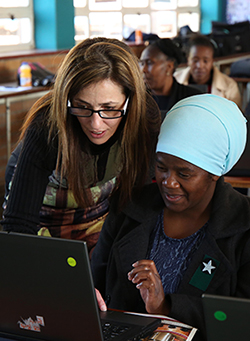Latest News Archive
Please select Category, Year, and then Month to display items
03 October 2018
|
Story UFS
|
Photo Katlego Sekele
 Students engaged authorities and Student Affairs
representatives on sexual and gender-based matters.
Students engaged authorities and Student Affairs
representatives on sexual and gender-based matters.
Do you know enough about the Sexual Harassment, Sexual Misconduct and Sexual Violence policy adopted by the university in June 2018? The Office for Gender and Sexual Equity (GSE) at the University of the Free State (UFS) hosted a dialogue on the role of the institution in matters of sexual and gender-based violence and addressing issues surrounding sexual violations.
Developments such as the countrywide #TotalShutdown: Intersectional Women’s March Against Gender-based Violence last month serve as proof of the dire need for issues surrounding sexual violations to inform policies and active safety measures.
Policy purpose
According to the policy, the objectives are to create a safe and enabling environment, establish a common understanding of what constitutes sexual harassment, sexual misconduct and sexual violence, provide applicable and accurate information, ensure that victims receive the necessary support, clearly outline disciplinary procedures for perpetrators, and clarify institutional accountability.
Student’s take on solutions
Tammy Fray, a member of the Student Representative Council, who formed part of the panel at the discussion, says the policy is not a one-stop-shop solution. “The policy is a guiding document. We have to then use it to inform activist work. We cannot always put the onus on policies and codes of conducts to solve problems. However it is our responsibility within this academic space to come up with solutions that enhance the way the policy works.”
Be informed about the policy
It is important to understand the stipulations of the policy in order to make full use of it. Geraldine Lengau, Officer at the GSE said: “It’s important that students know that the institution is not operating in silos but that their demands have been heard and the institution has acknowledged that there is a need for the policy to be adopted. It also makes the process of reporting better with the assistance of the Sexual Assault Response Team coordinator.”
Digitising the Advanced Certificate in Teaching (ACT)
2017-02-06

The 100% online ACT aims to help
teachers improve their qualifications.
More information is available at
http://www.ufs.ac.za/ACTonline.
Photo: Supplied
Online learning is fast becoming the most convenient and affordable way to study. In 2016, the South Campus of the University of the Free State (UFS) became the first university in South Africa to launch a fully online course for current teachers to upgrade their qualifications; the Advanced Certificate in Teaching (ACT).
The IDEAS Lab digitisation team on our South Campus is responsible for converting the existing ACT modules from a blended format to a 100% online format. With this format all lessons and study material are available online, with no contact sessions required. The advantages of online, interactive learning far outweigh those of blended learning. Lessons are converted to videos online, which is not only more user-friendly, but students can also access the lessons repeatedly.
In addition, tutors are always available, with WhatsApp groups and the ACT Online Facebook page further facilitating the support provided. Discussions between or communication with students situated in remote areas is made possible, adding to an enriched student experience. Immediate feedback on activities serves as a diagnostic tool as well as motivation for the students.
Lesson videos are recorded at the IDEAS Lab Studio at the South Campus or onsite at various schools. Students are expected to complete a unit, which consists of two lessons, per week.
There are “think about your learning” activities after each lesson as well as “after readings” to ensure that students have grasped the material. In these and many other ways the online ACT is specifically designed to suit students’ unique needs and make their studies a satisfying and rewarding experience.